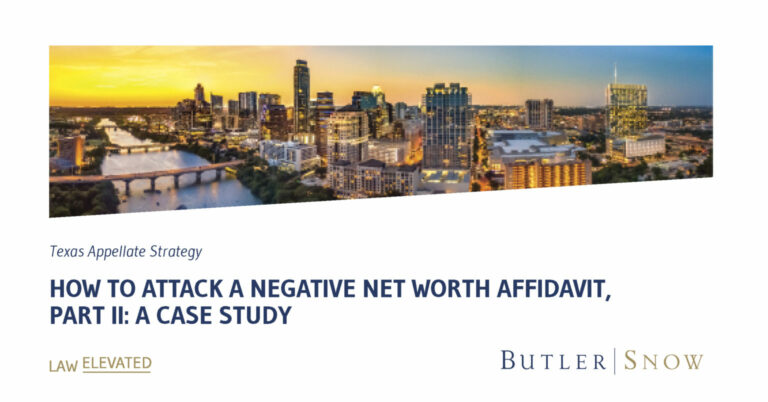In Part I of this two-part series, we covered the basic procedure for attacking a negative net-worth affidavit filed to supersede a money judgment. This post offers a case study for successfully applying that procedure and defending the trial court’s ruling on appellate review.
Background
The trial court rendered judgment on a jury verdict that appellants committed fraud and fraudulent transfer in connection with the purchase of oilfield pipe casing. The jury pierced the corporate veil to conclude that two individual defendants (a husband and wife) were responsible for the conduct of a third defendant, a corporation they owned and controlled. Appellants were jointly and severally liable for the $325,157.60 in compensatory damages awarded in the judgment.
Shortly after the trial court signed the judgment, appellants each deposited $200 into the court’s registry and filed affidavits claiming a negative net worth. The appellee sent post-judgment discovery and filed a contest to appellants’ claimed net worth.
The Hearing and Ruling
The hearing closely resembled a bench trial. Appellants admitted into evidence a balance sheet purporting to show a company net worth of –$4,839,146.79, a personal financial statement purporting to show a net worth of –$2,553,193 for the husband, and a personal financial statement purporting to show a net worth of –$3,571,589 for the wife. Appellants and their CPA testified.
Appellee retained a forensic accounting expert to help oppose the negative net-worth affidavits and testify at the hearing. The expert reviewed the affidavits, financial statements, and documents produced in post-judgment discovery and prepared a detailed report. The report concluded—and the expert testified at the hearing—that appellants’ financial data was not examined, prepared, or presented in accordance with generally accepted accounting principles (GAAP) and that the positions taken were not credible.
The trial court sustained appellee’s contest and, at appellees’ request, issued findings of fact and conclusions of law. Among other things, the trial court found (1) that appellants each failed to satisfy the burden of proving their net worth; and (2) from the evidence presented, it was unable to determine the net worth of any of the appellants or to state with particularity any factual basis for such a determination.
The trial court set the supersedeas bond for each appellant at $355,562.37, representing compensatory damages awarded in the final judgment ($325,157.60), interest on that amount for the estimated duration of the appeal, and costs awarded in the judgment.
Appellate Review and Outcome
Appellants filed a motion to review the trial court’s order in the appellate court where their appeal had been docketed. The record had not been filed when appellants brought the motion, so they borrowed from mandamus practice and submitted the documents they thought were relevant. The motion and response were closer to appellate briefs than routine appellate pleadings.
In a detailed opinion, the appellate court applied the abuse-of-discretion standard to the trial court’s findings and affirmed the order. The court outlined the major points of disagreement about whether appellants’ financial statements complied with GAAP, reviewed the conflicting testimony, and noted the conclusion of appellee’s expert that appellants’ evidence did not provide sufficient information from which to determine their net worth. Noting that appellants’ burden on review was to show that the evidence conclusively established all vital facts, the court was free to credit one expert over the other, and it chose to believe the testimony from appellee’s retained accountant. See Tex. Black Iron Inc. v N. Am. Interpipe Inc., No. 14-20-00068-CV, 2020 WL 10231117 (Tex. App.—Houston [14th Dist.] July 28, 2020, order [mand. denied]).
Takeaways
All is not lost if the judgment debtor supersedes the judgment with a negative net worth affidavit. The judgment creditor should file a contest and put the judgment debtor to its proof.
Because the abuse-of-discretion standard applies, winning the contest in the trial court is crucial. If the judgment is significant, you should prepare as you would for a bench trial.
The evidence at a net worth hearing can be very dry and tedious to get through. Testimony from a forensic accountant is extremely helpful and can be well worth the expense. The expert should review the affidavits and other evidence on which the judgment debtor relies and form an opinion about whether the judgment debtor’s evidence complies with GAAP. The expert can help you take the judgment debtor’s positions apart, especially if the judgment debtor fails to present expert testimony of their own, and may be able to cast significant doubt on the judgment debtor’s credibility.
When the judgment debtor’s credibility or accounting is questionable, the time and expense of a contest can be worthwhile. With expert help, you just might turn that negative net-worth affidavit into a full supersedeas bond.
